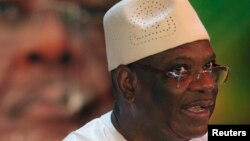UNITED NATIONS —
Mali's newly-elected President Ibrahim Boubacar Keita called on Thursday for nations in the Sahara region to create a regional multilateral force that could intervene quickly to respond to the ongoing Islamist threat across the area.
Attacks in Niger, growing instability in southern Libya and clashes between Tunisian government troops and Islamist militants have shown how al-Qaida-linked rebels have taken advantage of a security vacuum in the region since French-led forces intervened in Mali earlier this year to oust them.
Despite the presence in Mali of some 3,200 French troops and the U.N. peacekeeping mission in Mali (MINUSMA), trafficking routes across West Africa remain wide open, from Mauritania on the Atlantic coast, through Algeria and Mali, into Niger and Libya, officials say.
Regional rivalries are aggravating the problem for Paris and its Western allies, with a lack of cooperation between Saharan countries helping militants to melt away when they come under pressure and regroup in quieter parts of the vast desert.
"This sort of initiative has been difficult, but facing the terrorist threat we need to find a solution,'' Keita, who was elected in August, told a high-level meeting on the Sahel region during the U.N. General Assembly.
The session focused on discussing an integrated strategy proposed by the United Nations ranging from security to humanitarian and economic issues ahead of a November fact-finding mission by U.N. Secretary General Ban Ki-moon to the Sahel.
"The level of fragility is still high in the region and international focus is beginning to wane,'' U.N. Sahel special envoy Romano Prodi said. "The possibility of criminal and terrorist activities remains very high.''
The Sahel stretches from Mauritania in the west to Eritrea in the east, including Burkina Faso, Chad, and Sudan, a belt dividing the Sahara desert and the savannahs to the south.
France's intervention in Mali was aimed at heading off the risk of the country being used as a springboard for jihadist attacks in the wider region or Europe.
With Paris still needed to provide much of the logistics, the planned reduction of its troop numbers is behind schedule, although officials say it still aims to reduce its numbers to 1,000 by year-end leaving behind that force to intervene if needed in Mali and elsewhere.
"The situation in Mali has been stabilized, but that doesn't mean that it is in all of the Sahel,'' French Foreign Minister Laurent Fabius told reporters. "While the terrorists in Mali have been neutralized, some have been able to escape elsewhere, so we need to be vigilant and need a regional approach.''
He added that his country would host African heads of state in Paris in December to come up with a common security plan.
Attacks in Niger, growing instability in southern Libya and clashes between Tunisian government troops and Islamist militants have shown how al-Qaida-linked rebels have taken advantage of a security vacuum in the region since French-led forces intervened in Mali earlier this year to oust them.
Despite the presence in Mali of some 3,200 French troops and the U.N. peacekeeping mission in Mali (MINUSMA), trafficking routes across West Africa remain wide open, from Mauritania on the Atlantic coast, through Algeria and Mali, into Niger and Libya, officials say.
Regional rivalries are aggravating the problem for Paris and its Western allies, with a lack of cooperation between Saharan countries helping militants to melt away when they come under pressure and regroup in quieter parts of the vast desert.
"This sort of initiative has been difficult, but facing the terrorist threat we need to find a solution,'' Keita, who was elected in August, told a high-level meeting on the Sahel region during the U.N. General Assembly.
The session focused on discussing an integrated strategy proposed by the United Nations ranging from security to humanitarian and economic issues ahead of a November fact-finding mission by U.N. Secretary General Ban Ki-moon to the Sahel.
"The level of fragility is still high in the region and international focus is beginning to wane,'' U.N. Sahel special envoy Romano Prodi said. "The possibility of criminal and terrorist activities remains very high.''
The Sahel stretches from Mauritania in the west to Eritrea in the east, including Burkina Faso, Chad, and Sudan, a belt dividing the Sahara desert and the savannahs to the south.
France's intervention in Mali was aimed at heading off the risk of the country being used as a springboard for jihadist attacks in the wider region or Europe.
With Paris still needed to provide much of the logistics, the planned reduction of its troop numbers is behind schedule, although officials say it still aims to reduce its numbers to 1,000 by year-end leaving behind that force to intervene if needed in Mali and elsewhere.
"The situation in Mali has been stabilized, but that doesn't mean that it is in all of the Sahel,'' French Foreign Minister Laurent Fabius told reporters. "While the terrorists in Mali have been neutralized, some have been able to escape elsewhere, so we need to be vigilant and need a regional approach.''
He added that his country would host African heads of state in Paris in December to come up with a common security plan.





